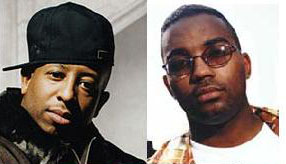Shop-Talk Elevates the Beatmaking Art Form and Tradition
| By AMIR SAID (SA’ID) |
 Musicians have long shared tricks of their trade amongst each other. It’s a tradition as old as popular music itself. However, for some reason, many beatmakers (producers) pride themselves upon keeping a vale of secrecy over their beatmaking methods. What gives?
Musicians have long shared tricks of their trade amongst each other. It’s a tradition as old as popular music itself. However, for some reason, many beatmakers (producers) pride themselves upon keeping a vale of secrecy over their beatmaking methods. What gives?
I could speculate about the cultural undertones of this, but that’s not what this piece is about. On the contrary, this article is about why the notion of secrecy (specifically among some well-known beatmakers {*producers*}) in beatmaking is ridiculous. As I told a fellow beatmaker the other day, “there are NO secrets between real musicians!” What I was saying (and he understood immediately) was that dedicated musicians share a common fundamental goal: to develop their skills and elevate their craft. Indeed, this is why we constantly seek out people and resources that we believe will help us reach that goal. In this regard, beatmakers should not view themselves any different. We are musicians, and as such, we stand to benefit a great deal from an exchange of information.
No Two Beatmakers Are One in the Same
Regardless of the method or technique used, no two beatmakers are the same. Given the same tools and the same understanding, each of us will inevitably develop our own approach. And I’ve found that it is within this approach that you find the most interesting “secrets.” But instead of having an attitude that promotes the talking of shop (beat talk, if you will), when pressed for specific ideas, secrets, and the like, some beatmakers clam up, or offer the proverbial: “don’t wanna’ give the secrets away.” Huh? What’s that all about.
Listen, at face value, there are NO magic secrets that can instantly transform a beatmaker’s skills. Secrets (or better yet, pointers, tips, hints, insights) are only as good as the beatmaker who understands them and can, in turn, incorporate them into what they’re already doing. For example, DJ Premier is known for his drums, chops, and his ability to finesse the bass out of the breaks that he chooses to use. However, there is no doubt (and he has said as much), that he would not have been able to develop those skills, had it not been for Large Professor. As Premier told me (rather matter-factly), it was Large Professor—another beatmaking pioneer in his own right—who showed him how to filter bass sounds in samples, and also how to make the Akai S950 really work for him. In turn, Premier introduced Large Professor to a new way of diggin’ in the crates and surveying music. And before that, another beatmaking pioneer, Showbiz, schooled Premier on diggin’ in the crates and surveying music. Thus, these examples of sharing trade “secrets” demonstrates how, for each of the aforementioned beatmaking pioneers, the common goal was to get better and elevate the art form.
Needless to say, I’ve always been against the notion of not not sharing knowledge (“secrets”). In fact, those who know me, know very well that I consistently share as much as I can, whenever I’m asked by a fellow beatmaker. Likewise, some of the most well-known beatmakers have shared as much as they could with me. Also, consider this, even if one beatmaker breaks down their entire beatmaking process to another beatmaker, chances are, the latter beatmaker isn’t going to utilize everything that he (or she) learns from the former. Not at all. The latter beatmaker is only going take what he needs and/or can use from the other beatmaker’s process. It’s this sort of exchange that each beatmaker can use to further develop their skills.
Final note, keep this in mind: the entire beatmaking (hip hop/rap production) tradition is only as good as its weakest beatmaker. Hence, there’s merit in all of us trying to help each other step up our skills.

back when i was in school, i met this talented beatmaker. His stuff was top notch and he was getting his placements. When i asked him if he could share some of his ‘secrets’ with me, he said he couldn’t. when i asked why he said, when i was learning how to make beats, no one would show me anything. I used to intern for Teddy Riley and he would be careful with what he would show me and not show me. So I had to learn everything on my own. So for me to just tell you my secrets that took me years to learn and figure out would be a disrespect to my craft
I don’t necessarily agree and i don’t expect anyone else to but i guess its just a way to look at it.